How To Fix Loose Handle On Kitchen Faucet
Quickly install a kitchen faucet by following this expert do-it-yourself advice on how to install a kitchen faucet with illustrated with step-by-step photos.
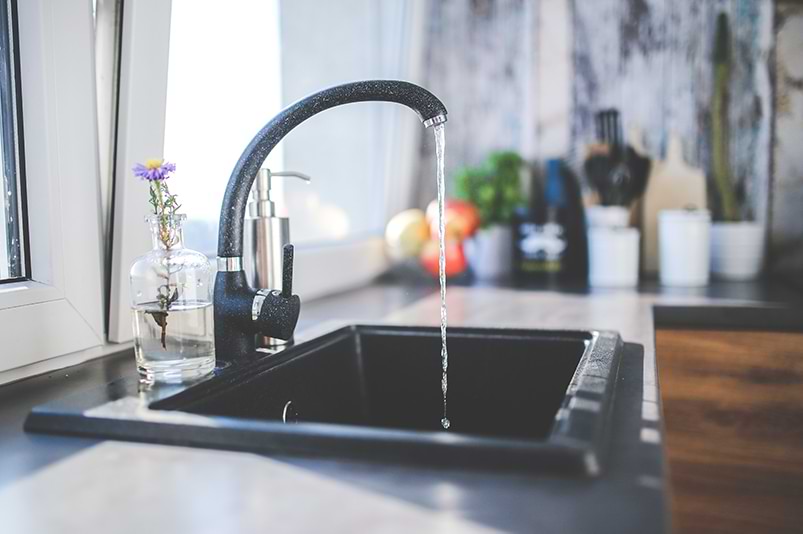
The main determinant of how easy or difficult it is to install a faucet is access. Installing a faucet into a new sink is simple because you can fasten the faucet parts onto the underside of the sink before setting the sink in place. This way, you have full access to the faucet parts, including the hard-to-reach mounting nuts.
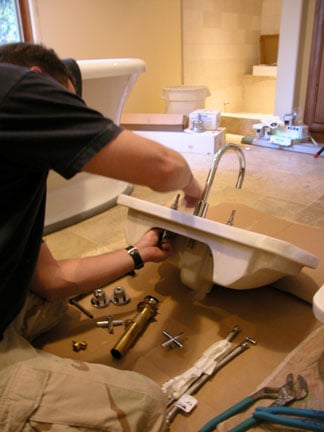
If the sink is already in place—and let's face it, most are—replacing a faucet can be a challenge since your only access is from under the sink. This will require you to lie on your back and work around the supply lines to get to the mounting nuts that will secure the faucet. Obviously, it pays to clean out the cabinet under the sink before beginning this job. With some cabinets, it makes sense to remove the cabinet doors, too.
Even with the aid of a nifty tool called a basin wrench that extends your reach, it can still be an awkward task to install a faucet on some kitchen sinks because it's difficult to work up behind the sink bowls from the cabinet below.
Removing the sink first can be an easier option, depending upon the type of sink, though this is rarely the case.
After installing your new faucet as detailed below, remove the aerator from the faucet and flush the lines to ensure that any debris does not clog and reduce the water flow.
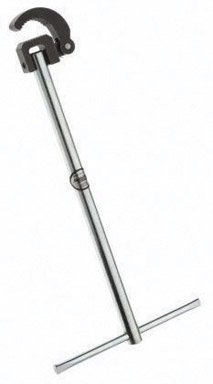
On a standard faucet, simply unscrew the aerator at the end of the spigot and let the water run for a minute or two. With a pullout sprayer faucet, the aerator/filter is housed in an inlet in the sprayer head. Just unthread the hose, remove the aerator/filter, and flush.
How to Install a Kitchen Faucet: Step-by-Step
Many new faucets require some assembly before mounting to the sink; if that is the case, follow the manufacturer's directions.
1 With most pullout sprayer faucets, the sprayer needs to be threaded through the faucet body first.
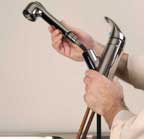
2 Insert the rubber gasket between the base plate of the faucet and the sink top to create a watertight seal. If no gasket is provided, pack the cavity of the faucet with plumber's putty, then insert the faucet body through the holes in the sink top.
Thread the mounting nuts provided onto the faucet shafts, then center the threaded shafts in the sink's holes and tighten the nuts firmly.
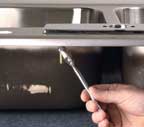
3 Install the mounting nut. Many manufacturers include a special long socket specifically to aid in tightening the mounting nuts.
A hole in the socket accepts the shank of a screwdriver, guiding it as you tighten the nuts. If you're mounting the faucet on an installed sink, use this method.
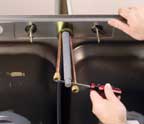
4 If you're installing a pullout sprayer faucet–or a faucet with a separate sprayer–now is the time to connect the sprayer to the faucet body.
Check the manufacturer's directions to see if using pipe-seal tape for this connection is recommended. Use an adjustable wrench to tighten the connection.
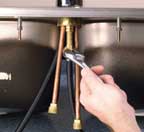
5 Add the counterweight. Most pullout sprayer faucets and faucets with separate sprayers come with a counterweight that attaches to the sprayer hose. This weight helps retract the hose back in to the sink cabinet after you've used the sprayer.
Follow the manufacturer's directions on where to secure the weight, and take care not to crimp the hose as you attach the weight.
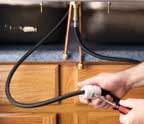
6 Hook up the faucet's hot and cold supply lines to the water supply shutoff valves under the sink.
If necessary, gently bend the copper tubes coming out of the faucet for better access and connect flexible supply tubes to them. Simply wrap a couple of turns of pipe-seal tape around the threaded nipples on the valves and connect the tubes. Tighten the nuts with an adjustable wrench.

How to Install a Faucet: Kitchen or Bath?
Installing a faucet on a kitchen sink is a bit different than putting a faucet on a bath sink. With a kitchen sink, you may have to deal with additional obstacles, such as a water filter and/or a garbage disposal. When installing a bath sink's faucet, you'll also install the pop-up drain stopper.
ALSO READ: How to Install a Bathroom Faucet
Featured Resource: Get a Pre-Screened Local Plumbing Pro
Call for free estimates from local pros now:
1-866-342-3263
![]()
How To Fix Loose Handle On Kitchen Faucet
Source: https://www.hometips.com/diy-how-to/install-kitchen-faucet.html
Posted by: woodsterestand.blogspot.com

0 Response to "How To Fix Loose Handle On Kitchen Faucet"
Post a Comment